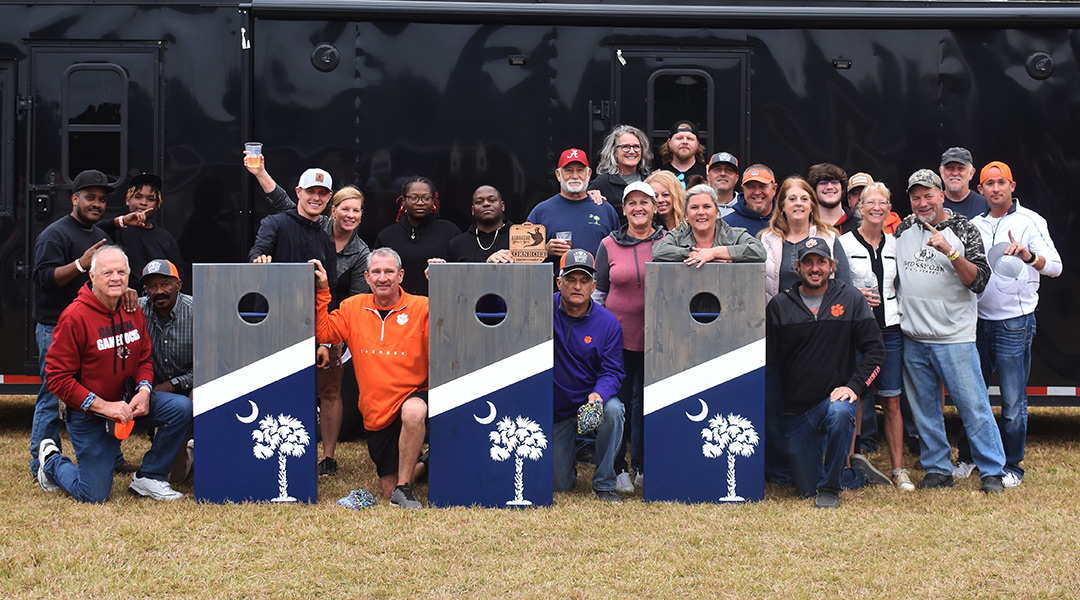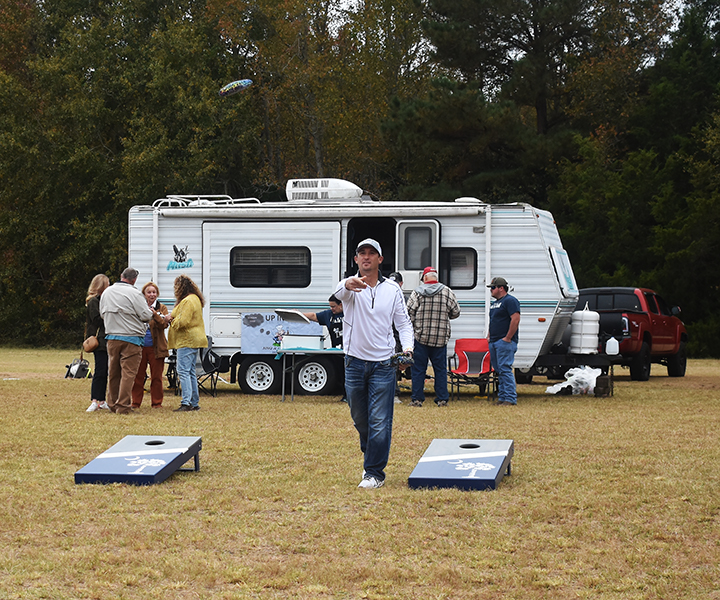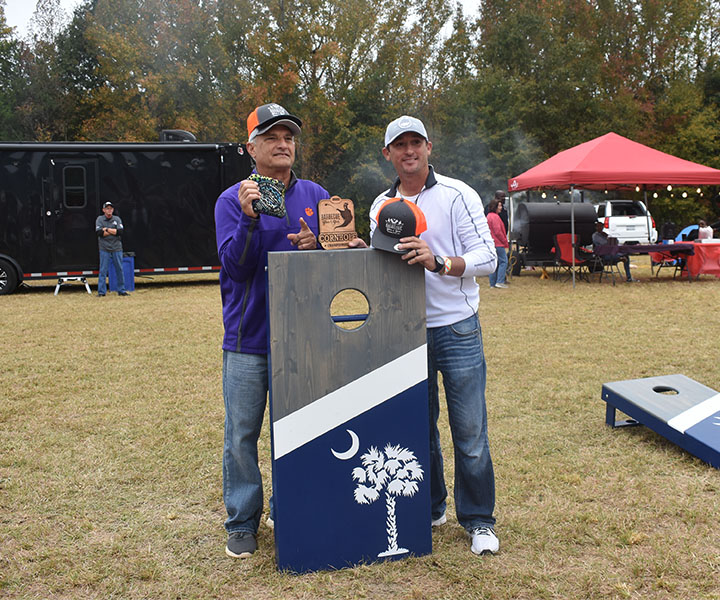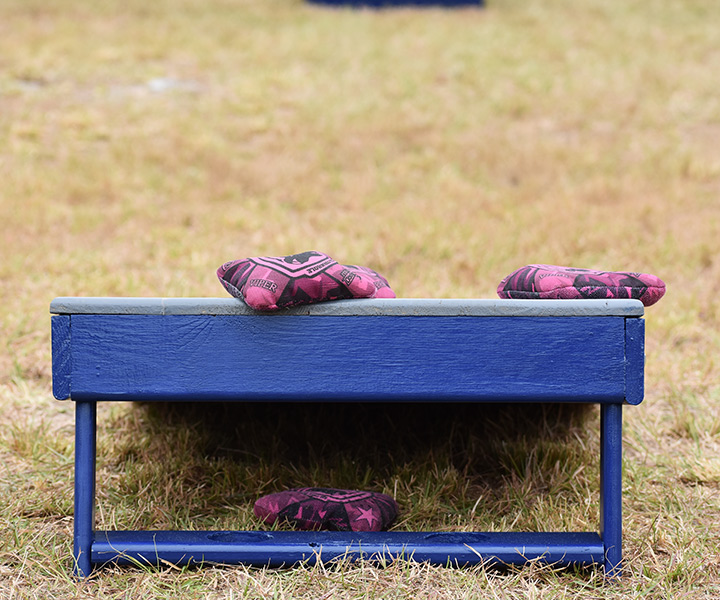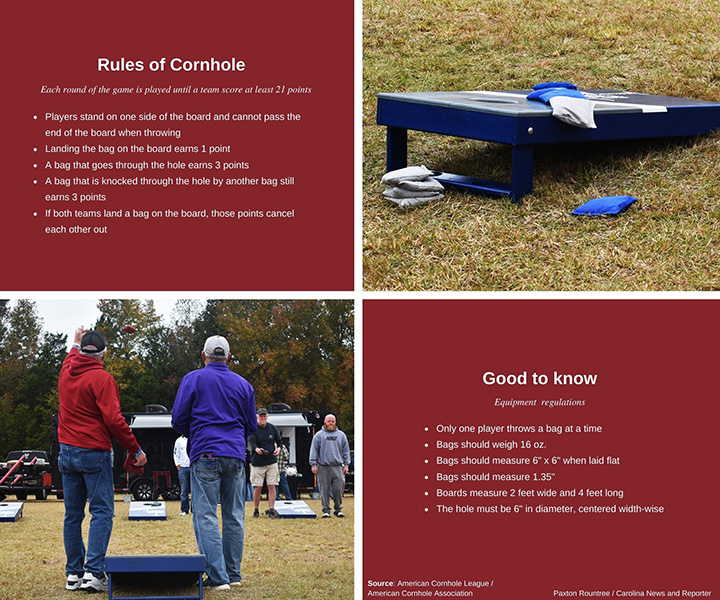Group photo of players at BBQ Blues & Boos cornhole tournament (Photos by Paxton Rountree)
Robot almost never misses the hole on the board.
“A lot of guys in Lexington call me ‘Robot,’” 79-year-old Haskell Williams said, “cause I do the same thing every time.”
In October, while walking around the Barnwell field that is host to BBQs Boos & Blues cornhole tournament, Williams maneuvers around the 20 boards that line the game play area and avoids bags being thrown. He is surrounded by people choosing one of the 16 BBQ stands that are set up along the field as live music plays in the background.
Williams is a fixture here to all ages, though he prefers hanging out with the other older players.
“It’s always a pleasure to get to throw with people your own age, instead of playing with these young jet-lags all the time,” Williams said, laughing.
He has been playing cornhole professionally for about a year and a half and placed fifth in the world championship in August.
Williams has joined the ranks of thousands around the country who have transformed cornhole from a casual game into a professional sport in recent years.
Professional players take it seriously. So much so that it has become a professional sport featured on ESPN. Its national headquarters, and its national championship tournaments, are in South Carolina.
“You got to be willing to tinker with your swing to find out what are you going to be most consistent with,” said Eric Snellings, a former professional player.
Snellings said it is a game of using wrist angles to keep the bag flat as it flies towards the board.
“You might want to get it where (the bag) tilts a little to the left, a little to the right, and that comes with practice,” Snellings said.
Snellings got into cornhole after playing with friends.
“People play cornhole as a backyard thing,” Snellings said. “That’s how I got started.”
He wanted to take the sport more seriously after going to tournaments and seeing how good some other players were. It made him want to be better.
He ended up playing cornhole professionally from 2016 to 2020.
No longer a pro, Snellings and his partner Tom Sanders still won first place at the BBQ Boos & Blues tournament — a blind draw tournament where anyone, pro or amateur, can compete.
Entrants pay a fee, and the winner gets the pot. This win brings the pair $500.
Some tournaments, however, have more stringent entry guidelines. American Cornhole League tournaments, for example, are for professionals only.
The American Cornhole League was founded in 2015, and the first championship event was held in 2016. It’s headquartered in Rock Hill, where the world championship is held each year.
“Cornhole is growing in all facets,” said Trey Ryder, chief marketing officer for the ACL.
In the past two years, the league has seen a 400% growth on social media interactions, 50% growth in the number of players and 40% growth in number of tournaments, Ryder said.
The ACL had more than 700 players try to become professionals this year. Tryouts cost $150. Those who succeed can participate in professional tournaments, which offer more prize money than amateur tournaments, such as Barnwell’s.
The 2021 male and female ACL champions last year won $10,000 each. Team winners received $40,000, which is $2,500 per player.
And tournaments have started in Canada and Europe.
“By every metric that we can measure, cornhole is on an overwhelming growth path,” Ryder said. “We just want to kind of continue to lean into that and then continue to see it grow.”
The growth of cornhole not only has allowed players to become professionals, but for professionals to make serious money.
“Full-time professional cornhole players are making a very good living playing cornhole, just like golfers do,” Ryder said.
And, like golf, cornhole players acquire sponsorships.
Professional cornhole player Kamryn Belvin said sponsorships guarantee year-round income.
Belvin is sponsored by AAR Cornhole, a company that makes cornhole bags. She said female cornhole players get more sponsorship opportunities because cornhole is a male-dominated sport.
Belvin started playing cornhole at a young age, at family gatherings and tailgates. The idea of being a professional athlete and getting to be on ESPN enticed her, Belvin said.
“Top females are almost guaranteed TV time,” Belvin said. She has been on ESPN several times but seemed casual about her new stardom.
The impact of ESPN, however, has been anything but casual.
“This past year at Rock Hill for the championship, we had 48 of the 50 states show up,” said Dustin Thompson, conference director for North Carolina and South Carolina and a former professional player himself.
Thompson said he started playing cornhole about 10 years ago when a group of friends invited him to compete at a local tournament. Their team won. He “got the bug.” Money helped motivate him. Thompson played professionally for four years before moving into his administrative job.
Williams said it’s a sport that anyone can pick up, something he can play “at his age.”
And, “there’s not another sport out there that you can make 100% everything at your house,” Thompson said, referring to the board and bags.
Ryder said the ACL has a five-year plan to grow the sport further. He wants a $5 million prize pool for professional players and 500,000 players playing cornhole in the ACL and 50 in countries across the world.
“We have plans to be in Australia next year as well as go back to Europe,” Ryder said.

